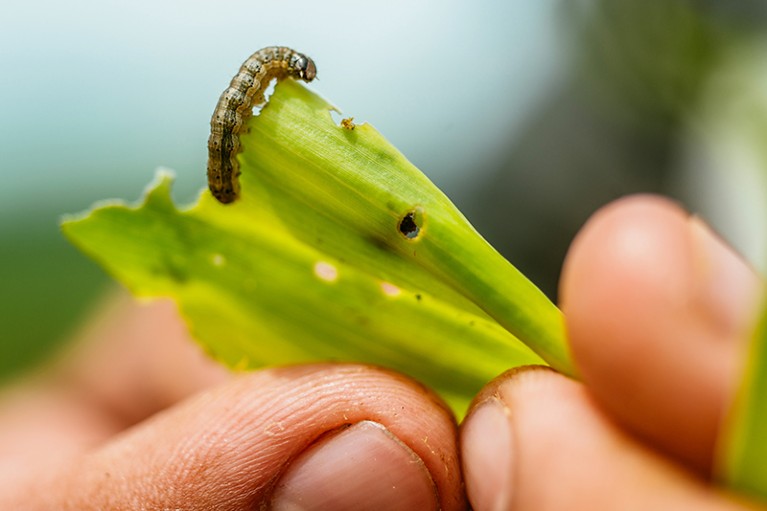Hello Nature readers, would you like to get this Briefing in your inbox free every day? Sign up here.

The invasive fall armyworm has laid waste to crop plants around the world.Credit: Waldo Swiegers/Bloomberg/Getty
China’s corn crop at risk from caterpillar
The invasive fall armyworm (Spodoptera frugiperda) is gaining a foothold in China, threatening maize (corn) crops in the world’s second-largest producer. Armyworm outbreaks in Africa and southern Asia have resulted in yield losses as high as 50%. Researchers in China are studying chemicals that could be used to attract the caterpillars into traps, and native insects that could be deployed as a means of biological control. The caterpillar puts further pressure on the food system in China, where African swine fever has pushed farmers to kill more than one million pigs.
WHO resists declaring Ebola emergency
For the third time since the Ebola outbreak in Central Africa began, the World Health Organization (WHO) has decided against declaring it a public-health emergency of international concern. The outbreak spread from Democratic Republic of the Congo into neighbouring Uganda last week, raising concerns about whether health officials can contain the spread. WHO director Tedros Adhanom Ghebreyesus said that “although the spread of Ebola to Uganda is tragic, it is not a surprise” and “the fundamental dynamic” of the outbreak had not changed.
FEATURES & OPINION
The story of the radiocarbon revolution
From dating the Turin Shroud to tracing drugs through phases of the body’s metabolism, a wonderfully engaging new book about carbon-14 explores the science of the time-tracking isotope — and why we should care.
How to adapt to a new working language
Despite growing up speaking Mandarin with her parents in the United States, medical researcher Lisa Liu discovered that relocating to China was difficult. She shares six tips for adapting to a new language and culture, from finding helpful apps to diving into tricky pop-culture chats.
“A wholly unexpected change in my internal being”
“After refreshing our browsers, I knew instantly that my biological father was not the man who raised me,” writes leading chemical biologist Stuart Schreiber in the moving tale of how a commercial DNA test overturned much of what he had known about his family history. Schreiber’s powerful story touches on childhood abuse, the joy of discovering new family members and how the experience was informed by his career as a “biomedical truth seeker”.
